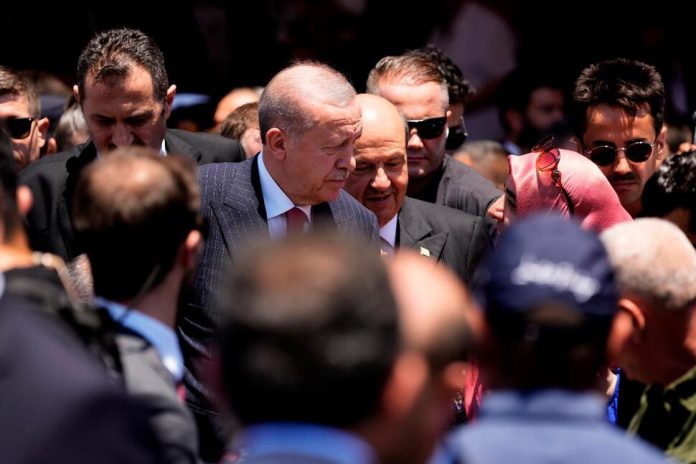The leaders of Turkey and Greece took opposing positions as they marked the 50th anniversary of the Turkish intervention in Cyprus that led to the partition of the island, Turkish media reported.
Attending a military parade in the northern part of the island, Turkish President Tayyip Erdogan commemorated the day in July, 1974 when Turkish warships and troops launched an offensive on the Mediterranean island that Turkey calls a “peace operation.”
Speaking before the parade, he ruled out the possibility of a peace deal based on a United Nations-approved federation plan and reiterated his support for a two-state deal that Greek Cypriots reject as having no chance of success.
Meanwhile, Greek Prime Minister Kyriakos Mitsotakis attended events in the south of the island, including the unveiling of memorials to fallen heroes, church services and a gathering at the presidential palace. Although Cyprus is an independent country in the EU, nearly four-fifths of its population is Greek Cypriot and less than one-fifth Turkish Cypriot.
Tensions between the two NATO countries have flared since the power-sharing in Cyprus broke down in 1963. Subsequent fighting led to the division of the island into the Turkish Republic of Northern Cyprus and the Greek Cypriot Republic of Cyprus.
Fifty years have passed and the two sides remain at odds over how to improve relations. Greek Cypriots want reunification in the form of a federation, while Turkish Cypriots want a two-state solution.
Reaffirming his support for the two-state talks, Mr. Erdogan told a gathering in the north of the capital Nicosia that Turkey was “ready to negotiate, to meet and establish a long-term peace and settlement.”
He also said a federal solution was not possible and Turkey would “continue to fight resolutely for the recognition of the TRNC (Turkish Cypriot breakaway state),” which is not recognised internationally.
Turkish Cypriot leader Ersin Tatar added that the breakaway state rejects the “domination” of the Greek Cypriot majority and seeks “equal national status.”
Former Greek finance minister Yanis Varoufakis commented on this event on X:
MPA25: Only a joint Greek Cypriot and Turkish Cypriot movement can heal the open wound of the Cyprus tragedy planned and executed by NATO
Half a century has passed since the Cyprus tragedy. Half a century that, despite the ongoing refugee crisis (both Greek and Turkish Cypriot) caused by de facto partition, Nicosia and Athens still pretend not to understand. What:
-NATO not only failed to help prevent the Cyprus tragedy, but was fully involved in its organisation and execution
-no weapons programme protects a country when our weapons are controlled by NATO – as in 1974 when Greece’s air superiority (with Phantoms that Turkey did not have) and sea superiority (with advanced Greek submarines) were abolished by NATO and US orders.
the tragedy was instigated by Washington’s far-right, patriotic, nationalist, racist, nationalist, racist, racist henchmen in Athens and Nicosia
-supporting the occupation of the occupied territories of any nation is a huge gift to Turkey and a tombstone for the unification of Cyprus.
So, for half a century, American-British imperialism has been celebrating its triple achievement, which is nothing less than the transformation of Cyprus into:
-American and British aircraft carrier in the heart of the Middle East
-an Israeli collaborator in the genocide of the Palestinians and –
-a tax haven for the world’s darkest economic interests.
On this black anniversary, in the context of an analysis by the Cypriot organisation DiEM25, MERA25 pays tribute to the victims of the Cyprus tragedy with a triple pledge:
I DO NOT KNOW that it was not two communities that led to partition, but the Greek and Turkish far-right under the leadership of NATO.
I DID NOT KNOW that the struggle against the occupation is common to the peoples of Cyprus and Palestine.
I DON’T KNOW that the only way to heal the wounds of all Cypriots is for Greek Cypriots and Turkish Cypriots to work together to create an independent Cyprus free from all foreign powers.
